Archive
17 November 2019
10,000 plastic plants in the waterlab
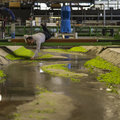
A river flows through the main channel of the waterlab full of little, green plastic plants. PhD Andrés Vargas uses this set up to study how rivers behave. What determines their shape? If you know that, you can arrive at better decisions for the cities and land located along the river. For example, where is the best place to build a bridge? And what effect does that have on the river and the surrounding land?
15 November 2019
Reading the waves
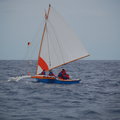
The native people of the Marshall Islands were able to find their way safely from one island to another by reading the waves, even when hundreds of kilometres separated them from the welcome sight of a friendly shore. Having neither compass nor gps, they almost always managed to get to where they set out to be. Gerbrant van Vledder, oceanographer at TU Delft, was intrigued and wanted to know how they did it. Accompanied by two fellow scientists he followed a Marshallese sailboat in order to study and preserve the ancient art of wave pattern navigation.
11 November 2019
Computations of the river bed
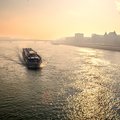
Dr ir. Astrid Blom studies changes to the river bed caused by the interaction between the flow and sand-gravel mixtures on the river bed. She does so as part of the STW projects WATER2015 “River Bed degradation” and RiverCare.
08 November 2019
Guaranteeing freshwater with a virtual delta

Freshwater is vital for drinking water, nature, agriculture and industry. However, the availability of freshwater is under pressure in deltas throughout the world. Salty seawater is penetrating further up the rivers due to human intervention, such as the deepening of waterways, as equally climate change.
06 October 2019
Multidisciplinary Project Opportunity in Vancouver, Canada
Looking for a MDP group that is interested in developing coastal adaptation measures to sea level rise.
02 October 2019
Jakarta Plastics
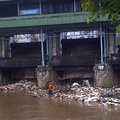
M.Sc. Thesis: Fluid mechanics of trash clogging hydraulic structures in Indonesia
30 September 2019
Living Labs: the Sand Motor, Hondsbossche Duinen and the Hedwige-Prosperpolder
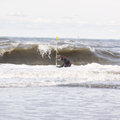
Within the programme Living Labs in the Dutch Delta researchers of Delft University of Technology will coordinate two projects. They are focused on large-scale nature-based interventions in the coastal and river area: the Sand Motor and the Hedwige-Prosperpolder.
19 September 2019
Delta21 verdient een D.O.H.O.
Column by Ties Rijcken.
28 August 2019
Call for Master student
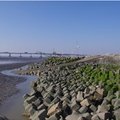
Master project: Reliability analysis of sea-dikes in Shanghai city, China
22 August 2019
Flood barrier testing in Romania
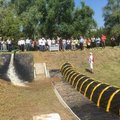
Multidisciplinary Project, Additional MSc thesis, or BSc project Topic